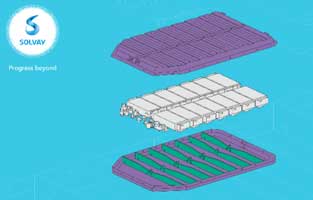Funding: Solvay/Airborne receive funding for composite alternative to metal battery enclosures; Nippon Shokubai awarded loan to expand battery materials business

Chemical firm Solvay has announced that its Battery Enclosure Materials Automation (BEMA) project for developing an all-composite solution for energy efficient battery packs has won major funding by Innovate UK as part of UK Research and Innovation, the UK’s national innovation agency.
This collaboration with Airborne, a technology leader in advanced composites manufacturing using automation and digitalisation, has already received letters of support from Jaguar Land Rover and Vertical Aerospace. They see great potential in the design of more compact and lightweight enclosures for high-energy batteries in future electric cars and aircraft, and are interested in the sustainability aspect of this project which aims to reuse composite waste.
“There is a pressing need to meet net-zero emission regulations and targets with more energy efficient electric powertrain and propulsion solutions,” says Mark Wright, EMEA Sales manager, Automotive, at Solvay Materials. “While already lending structural and weight saving advantages over metals in existing EVs and aircraft, fully composite battery designs for larger production volumes have yet to show their technical and manufacturing feasibility. BEMA seeks to deliver on these challenges by combining the benefits of Solvay’s advanced thermosetting material technology with Airborne’s expertise in flexible automated composite manufacturing systems to create lightweight next-generation battery packs. This will provide a significant step-change towards higher energy efficiency at reduced size.”
“As the demand for industrial quantities of composite battery enclosures grows, the challenge is to shorten the design phase, and provide Design-for-Automation guidance” says Joe Summers, Commercial Director of Airborne. “Working with Solvay will build material characteristics into Design-for-Manufacture rules for our multi-material automated ply placement technology, and subsequently allow us to connect our adaptable automation platform with intelligent planning and optimization”.
BEMA is currently in a pre-industrial testing and evaluation stage. Mechanical impact, shielding, thermal and fire performance tests are underway at Solvay’s Composite Materials Application Centre in Heanor, UK, and at external service providers. In a next project phase, prototypes will be produced to validate the new composite battery enclosure solutions in field trials and obtain proof of concept for industrialisation. The project will also address rate capability, cost and sustainability challenges. Tangible and dependable results are expected within an overall project time of two years.
In related news, Japan’s Nippon Shokubai says it has received a loan under Development Bank of Japan Inc.(DBJ)’s new KPI-based environmentally rated loan programme designed to support companies implementing initiatives aimed at solving social problems and increasing their corporate value simultaneously. It did not state the amount it received.
Nippon Shokubai will use the funds to expand its Ionel business, which is an electrolyte for lithium-ion batteries (a material designed to solve various problems with lithium-ion batteries).
Under the KPI-based environmentally rated loan program, the terms and conditions of the loan are based on the progress made towards achieving the numerical target set in the Nippon Shokubai Group’s plan that aims for 55 billion yen in environmental contribution product sales by fiscal 2024.
The company will use this loan to fuel growth of its Ionel business, said to be the world’s first commercialised lithium bis(fluorosulfonyl)imide (LiFSI) salt. Although degradation at high temperatures and a loss of performance at low temperatures are typical problems seen in lithium-ion batteries, it says Ionel can improve that performance over a wide temperature range and extend battery life. In recent years, Ionel is more and more highlighted as a material able to overcome the issues seen in the lithium-ion batteries used in electric vehicles (EVs), which are quickly becoming commonplace, it adds.
Nippon Shokubai is working on acquiring major customers and promoting early establishment of a cost-competitive manufacturing and sales structure in China, the world’s largest market for automotive lithium-ion batteries.
It has capital participation in Hunan Fluopont New Materials Co., Ltd. (a subsidiary of Shenzhen Capchem Technology Co., a major electrolyte manufacturer), which has been completed and it is currently discussing the expansion of our facilities.
(IMA)Subscribe to Get the Latest Updates from IMA Please click here
©2023 Injection Moulding Asia. All rights reserved.


















